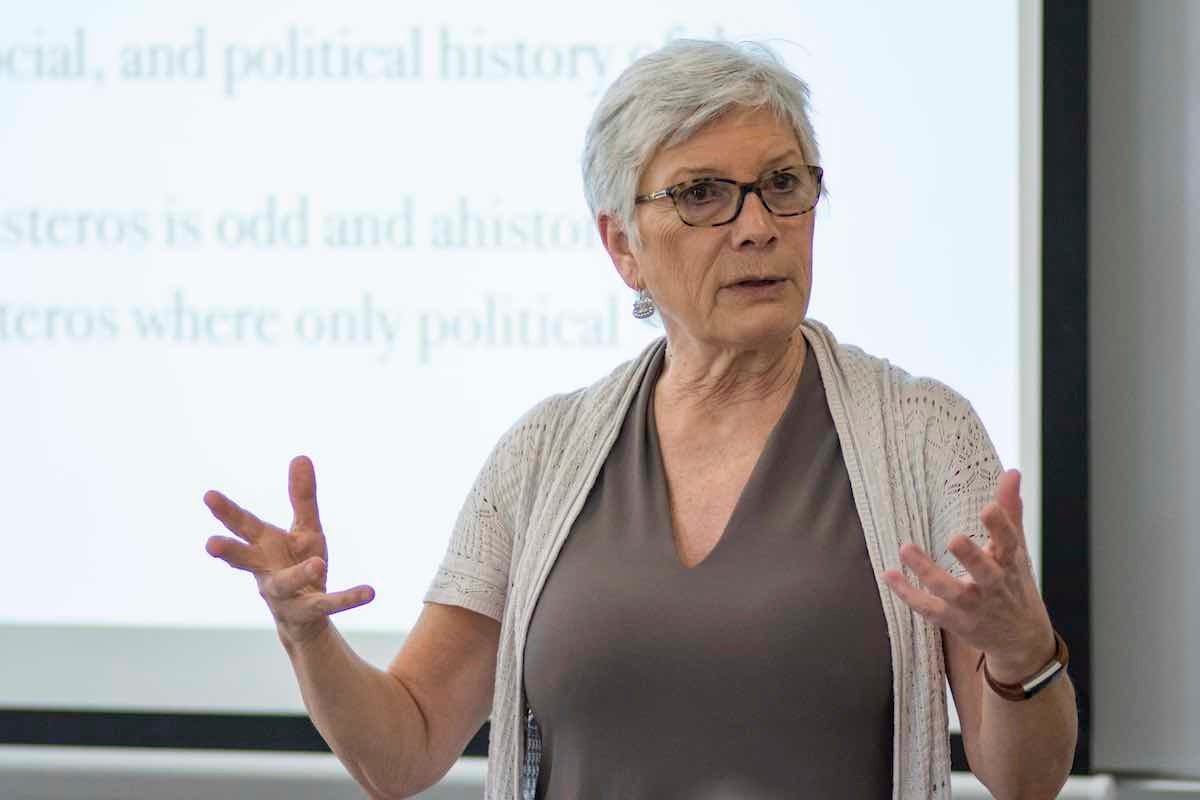KINGSTON, R.I. – Jan. 29, 2024 – Joëlle Rollo-Koster, a history professor at the University of Rhode Island and a renowned medieval scholar, has been elected a Fellow of the Medieval Academy of America, one of the highest honors that can be bestowed on a medievalist.
Rollo-Koster, of South Kingstown, was one of seven medievalists elected to the fellowship by current Fellows in early January, recognizing her career contributions to medieval studies in scholarship, teaching, mentoring and service. The Medieval Academy of America, which will celebrate its centennial in 2025, is the largest organization in the U.S. promoting excellence in the field of medieval studies. Rollo-Koster joins about 150 current Fellows and is one of only two Fellows from a Rhode Island college or university.
“I feel extremely humbled to be recognized by my peers as one of the top medieval historians in the field,” said Rollo-Koster. “The Medieval Academy of America is the only world institution for medieval historians, and I feel tremendously honored because the academy not only includes scholars in the U.S., but also those in other countries around the world.”
Rollo-Koster said she doesn’t remember what spurred her initial interest in the Middle Ages. But growing up in Toulon, France, on the Mediterranean coast, she had no siblings—and “books, and dogs, were my company.” In her first year at the University of Nice, she studied geography and history, and grew her passion for the French Revolution.
“Then I took one class in medieval studies and just fell in love,” she said. “It was just taking a course where I thought, ‘Look at the freedom. You can find all these new sources.’ There is so much you can do when not many people are working in the field. You do American history, you have a trillion people doing American history. The Middle Ages are way more open for new things.”
Rollo-Koster, who holds bachelor’s and master’s degrees in history from the University of Nice and a doctorate from the State University of New York at Binghamton, has found those new things.
In her research, she focuses on social and cultural life of the late European Middle Ages from the 1300s through the 1420s, and is recognized worldwide for her scholarship on the city of Avignon and its papacy, as well as the Great Western Schism. She is the author of eight books, including “The Great Western Schism, 1378-1417,” “Death in Medieval Europe: Death Scripted and Death Choreographed,” and “Avignon and its Papacy (1309-1417).” She is co-editor of the three-volume “Cambridge History of the Papacy,” which will be released by Cambridge University Press in 2025.
“I have always studied things that are institutional, such as the history of the papacy,” she said. “Some might say don’t rock the boat. Well, I have tried to remain respectful, but I am willing to rock the boat. There are a lot of different ways of looking at an institution and bringing in new ideas.”
In her work as a cultural historian, she has taken an interdisciplinary approach, employing methodologies from such fields as anthropology and archaeology. Of late, she has been exploring “sensorial” history as she researches what part the human senses—such as smell, hearing and sight—have played in history. “It’s something we have not touched on much, so it’s an opening field,” she said. “I am having a lot of fun with it.”
As she researches and teaches history that is more than 600 years old, she stays current. She’s comfortable talking about rapper Post Malone and his use of medievalism in a video, analyzing the portrayal of medievalism in the hit HBO show “Game of Thrones,” or lending her research to a viral animated TED-Ed video on the early 1400s dilemma when there were three popes.
One of her duties as a Fellow, she says, is showing that medieval history is very relevant in the present.
“I think it’s very important,” said Rollo-Koster. “Many of the legal, social, cultural structures we have today were born in the Middle Ages. Look at the impact of the evangelical movement on the Republican Party today. The idea to use religion politically is something that the Middle Ages invented.”
Her induction as a Fellow will take place in March at the Medieval Academy of America’s 99th annual meeting at the University of Notre Dame. She looks forward to joining a select group.
“When I am inducted, I’m going to sign a book in which the top medieval historians have been signing for nearly 100 years—people such as Hans Baron, Elizabeth A.R. Brown, James A. Brundage,” she said. “There is truly a sense of history.”

